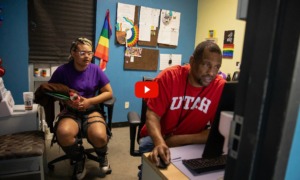For 20 years, few juvenile justice systems have done little more than study the problem of disproportionate minority contact (DMC) in the juvenile justice system. Is it possible someone has found a way to force change on systems? Edgar Cahn and Cynthia Robbins, who are spearheading the Racial Justice Initiative, are convinced they have.
Quietly, over the past year, Cahn and Robbins and a group of juvenile justice leaders at foundations, nonprofits and law schools have been crafting an approach they believe can persuade or coerce JJ systems to address DMC at the detention level.
The strategy boils down to two words: “deliberate indifference.” That concept was born of a 1989 Supreme Court case, City of Canton v. Harris, that had nothing to with juvenile justice. The court ruled that when government policymakers have a clear choice of alternatives, and follow one known to be an injurious course, it establishes a deliberate indifference to Constitutional rights.
Cahn and Robbins issued a 40-page legal article on the concept this week, just after hosting a colloquium on the initiative designed to implement it in Madison, Wisc. The whole operation is housed at D.C.-based nonprofit TimeBanks USA, a juvenile diversion program founded by Cahn in 1990.
Their theory follows this logic:
1) It is possible to use data to demonstrate to key decision-makers in a state or local jurisdiction that a disproportionate amount of minorities enter their detention center, and are detained for crimes that white youth are not.
2) It is possible – after 20 years of expensive research and pilot programs – to make those decision-makers aware of alternatives to detention that would be cheaper, more effective and less discriminatory. Cahn and Robbins specify a few in their brief: Youth Advocates Programs, multi-systemic therapy, multi-dimensional foster care, and many of the reporting centers and community supervision strategies espoused by the Juvenile Detention Alternatives Initiative (JDAI), a project of the Annie E. Casey Foundation.
3) Should a government choose not to use that information to make timely changes to the way it handles detention admissions, it would be possible to use class-action litigation to compel such a change using the test of “deliberate indifference.”
Historically, “courts have had a problem second guessing administrators, the executive branch,” said Cahn, “because of the notion of institutional competence;” the idea that you start from the assumption that policymakers have made their decisions rationally. He believes this new approach would thwart any assumption of competency because it would show that the decision-makers were opting for an injurious approach instead of a more effective and less expensive one.
It is not coincidental that the brief was issued to the public just before July 1, the first day of the new fiscal year in many states and a time when pretty much every state is looking for ways to save any penny it can.
Of course, corralling states and jurisdictions to make changes in their detention policies by charging them with “deliberate indifference” is just a theory until there is an actual court challenge. And that is just what Cahn said the Racial Justice Initiative intends to do. He has recruited legislative groups that will put hearings on DMC on state government schedules this year. That, he believes, will be the platform to present politicians with the facts on racial disparities in detention centers and the remedies for them. Pennsylvania is the most likely state to hold hearings in the near future.
What comes next? The best outcome, Cahn said, is to make a state (or county) juvenile justice director aware that litigation is a viable option down the line, and persuade it to settle on some commitments to address DMC. “We may well pick our initial places where we think we’ve got a frustrated type, who’d like the leverage” of a lawsuit to sell higher-ups on reform, Cahn said.
Another factor that may go into where this is tested concerns the federal court of appeals that would hear the case, if it were to go that far. Cahn mentioned the Ninth Circuit, which covers the West Coast, Hawaii and Nevada, as the circuit that might be most open to this line of argument.
It is a fascinating development in the long-neglected area of disproportionate minority contact.
DMC is the only one of the four core protections of the Juvenile Justice and Delinquency Prevention Act for which there is no history of litigation. There has been no shortage of anger over the lack of progress made on DMC, but the belief until now has always been that it would be impossible to sue a state over its actions in this matter. The federal statutes in JJDPA only require states to submit plans that address DMC
The two big questions going forward seem to be these:
·Will judges buy the idea that holding hearings to inform government policymakers of disparities and best practices establishes enough knowledge to hold a system liable for not changing?
A jurisdiction with high disparity “couldn’t challenge us on the disparity; we’ll prove that with their own data,” Cahn said. If there’s any kind vulnerable issue, he said, “it’s around the question of what do you have do to prove that something is known?”
·Can this work without the U.S. Congress toughening DMC requirements in the JJDPA, which is currently up for reauthorization?
“The community of people concerned about juvenile justice and reducing DMC need not and should not wait idly, hoping the next Congressional reauthorization mandates more effective enforcement,” Cahn and Robbins said in the brief.
Cahn and Robbins are not alone in their belief that this approach is feasible. The initiative has the support of the W.K. Kellogg Foundation ($383,000 since October) and Cahn is seeking new funding from Kellogg and a number of other sources. Civil rights groups are prepared and eager to handle court proceedings, plus legislative caucuses that are willing to hold hearings.
“It is wonderful to have creative minds developing innovative legal theories to challenge the most important issue in our justice systems today,” said DMC expert James Bell, speaking at a June 26 colloquium on the new strategy in Madison, Wis.. “Making jurisdictions liable for being deliberately indifferent to their over-representation of youth of color would be a true revolution in the field.”
For more on how the whole initiative came together, see part two.




























